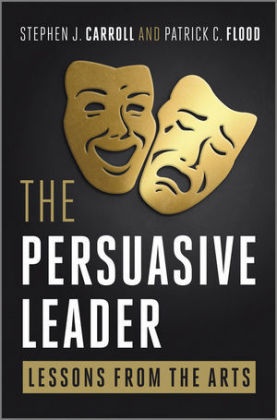Read more
Zusatztext '...this unique book is ideal for executives! organizational leaders! consultants! educators! and MBA students'. (Publicnet.co.uk! September 2010). Informationen zum Autor Stephen J. Carroll is a retired professor emeritus at the University of Maryland, who now works as a private consultant. During his career he has authored twelve books on psychology and organizational behaviour. He has served as a consultant to more than 30 industrial and government organizations and is a regular speaker at the University of Maryland and Syracuse University executive courses. He is best known for his books on performance assessment and leadership. He first developed the idea for this book in his courses for company executives where he found they responded particularly well to the case examples from the arts and from day to day life. Patrick C Flood is an Academic Fellow at Cambridge University. He has worked at the London Business School, University of Maryland, University of Limerick, Dublin City University and the London School of Economics. He is known primarily for his work on leadership teams and firm performance. His books include Effective Top Management Teams (2001, Blackwelll; Managing Strategy Implementation (with S.J.Carroll, Blackwell, 2000) (5000 copies sold over life) and Managing without Traditional Methods (Addison Wesley, 1996). He is currently external examiner at SAID business school and consults for the following companies: Pernod Ricard-Irish Distillers; Nypro-Clinton(US); Hewlett Packard (UK), Wang, Paul Partnership and VEC, Novartis, Nortel, ICL (UK), NHS(UK). Klappentext The communication aspect of leadership - to actively engage your followers and achieve understanding and motivation whilst making the message memorable - has never been more important. Using vivid lessons and examples from spheres outside business organization, The Persuasive Leader explores the leader's role as a communicator and teaches the fundamental principles of successful leadership.This book provides insights and principles about persuasive leadership from a broad range of human experiences. It draws on examples of persuasive leaders and persuasive leadership principles from the performing arts, the fine arts, literature, philosophical writings, and biography. The authors use their unconventional material to explore themes such as moral leadership, toxic leadership, learning from failures, 'distributed' leadership, leading for results and the leader as a mentor and counsellor. Zusammenfassung The communication aspect of leadership to actively engage your followers and achieve understanding and motivation whilst making the message memorable has never been more important. Inhaltsverzeichnis Foreword by Denise M. Rousseau xvi Preface xvii Acknowledgements xviii About the authors xix 1 Persuasive leadership in life and work 1 Beginning cases 2 What is leadership? 4 Persuasive leadership in a new world 5 A newer focus on emotions and logic 6 Leadership as a social role in all living groups 6 Leadership legacies 7 Leadership goals 8 Leadership sub-roles 9 Leadership in changing crcumstances 9 Leader agendas 10 Leadership and the arts 10 Parents as persuasive leaders 11 Leadership and strategies 11 Do leaders need charisma? 12 Persuasion as a key to all leadership efforts 13 Leaders as coherent wholes 13 Learning from examples 13 Types of persuasion settings 14 Types of Leadership 15 Leadership skills as identified in the arts and humanities 15 Do we need empirical studies of leadership? 16 Leaders and ethical behaviours 17 Leaders as examples of persuasive and moral principles 17 2 Usingaesthetics and the arts in persuasive ...

